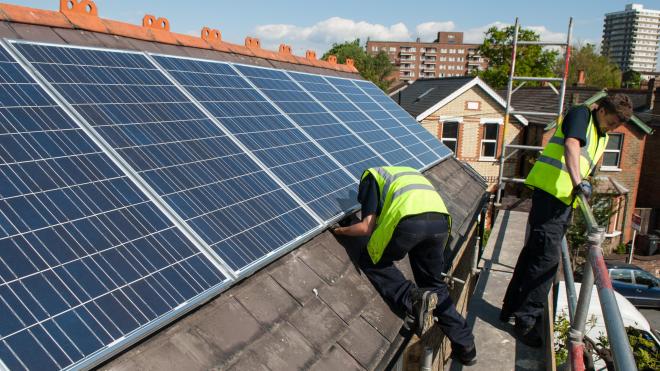Leicester’s ambition to be net zero carbon by 2030 will need an emergency response similar to the Covid-19 pandemic, according to an independent report.
Experts from global consultancy Ricardo Energy and Environment have set out the actions and investment required for Leicester to reach net zero carbon in the next eight years, as part of a roadmap report commissioned by Leicester City Council.

The report highlights the scale and challenge of Leicester achieving net carbon zero, but recognises that the city council “is in the vanguard of local authorities that are aspiring to achieve carbon neutrality before 2050, having set the ambition for the city to become carbon neutral by 2030.”
Leicester’s carbon dioxide emissions have already reduced by around 40 per cent since 2005.
The city council has also made good progress in cutting its own carbon emissions, with a 67 per cent reduction in ten years, from 45,458tCO2e in 2009/10 to 15,581tCO2e in 2020/21.
However, the new report suggests that for Leicester to reach net zero by 2030 will require a significant ramping up of the scale and pace of action in three key areas – buildings, transport, and energy – and that everyone will have a part to play.
An ambitious rollout of energy efficiency measures – including retrofitting energy efficiency measures to around 65,000 properties and around 100,000 homes swapping their gas boilers for heat pumps – could help reduce emissions by up to 35 per cent over the next eight years.
The report authors also propose that cleaner, greener transport – including an increase in walking, cycling and bus use alongside a massive increase in the uptake of electric vehicles – would result in a reduction in citywide emissions of around 14 per cent.
An increase in the number of solar panels being installed cross the city will also be required – from the current total of around 4,600 to over 50,000 panels by 2030.
The report also estimates that the net cost of the full range of measures required could range from £900milllion to £5billion over the next eight years. This could provide a huge boost to the local green economy, helping to create an estimated 5,000 to 10,000 local jobs.
Leicester City Council now plans to use the roadmap study inform preparations for its second Climate Emergency Action Plan, planned to start in 2023. It also hopes that the report will support the case for securing more investment, including from central Government, to support Leicester in playing its part in tackling the climate emergency.
Deputy city mayor Cllr Adam Clarke, who leads on transport, clean air and climate emergency, said: “When we declared a local climate emergency back in 2019, and launched our first Climate Emergency Strategy and action plan the following year, we were under no illusion about the scale of the challenge we had set ourselves as a city.
“The conclusions in this report are a stark but valuable reminder that we can’t be complacent in Leicester’s collective responsibility to tackle the climate crisis. The report will play an important role in showing us where we need to focus our efforts as we develop our second climate action plan.
“Although we have a huge amount to do as a city, we have a good record on carbon reduction which we can continue to build on. The first Leicester Climate Emergency Action Plan in 2020 signalled a shift in our ambitions and we made huge investment in exciting and ambitious projects that will further reduce the city’s carbon footprint.
“It is important that the city council leads by example, and does all it can to reduce its own carbon footprint to net zero, as well as encouraging and supporting others to reduce their own impact – something we are all increasingly eager to do. We know we need to do more but we can’t do this alone. To meet our ambitions as a city will require significant and ongoing support from the Government and local stakeholders. We all have a role a play.”
Since launching the first Leicester Climate Emergency Action Plan in 2020, Leicester City Council has led on a range of initiatives and secured external funding representing an investment of over £120million in low carbon initiatives.
This includes:
- Investment of over £14million in the UK’s first carbon neutral bus station building, which opened in June as part of the St Margaret’s Gateway regeneration project
- Progress on an £80million citywide programme of investment in sustainable transport backed by £40million from the Department for Transport’s Transforming Cities Fund (TCF)
- Investment of around £25million secured through the Salix Public Sector Decarbonisation Scheme for low carbon, energy efficient improvements to more than 90 council buildings, including schools, leisure centres, libraries and community centres.
- A successful bid for £19million of Government funding towards a £47million investment in increasing the city’s fleet of electric buses to over 100, backed by local bus operators Arriva and FirstBus.
- Launching an £8million programme of work that will see external insulation fitted to over 400 homes in the city, including council houses and housing association properties
- Securing £19million from the Government’s Levelling Up Fund for new low carbon workspaces at Pioneer Park and Ian Marlow Centre.
The most up to date figures from Government’s department for Business, Energy and Industrial Strategy (BEIS) show that Leicester’s citywide carbon dioxide (CO2) emissions in 2019 were 1,217.8ktCO2.
The figures also show that the calculated carbon footprint for each person living in the city has reduced by 60 per cent since 1990, from an estimated 8.5tCO2 to 3.4tCO2 in 2019.
Leicester City Council’s Economic Development, Transport and Climate Emergency Scrutiny Commission will consider the independent report at its next meeting next Wednesday, August 31.
For more details about the Leicester Climate Emergency Strategy visit: www.leicester.gov.uk/content/climate-emergency-strategy/



